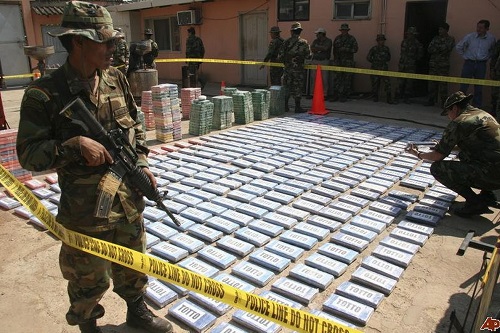AP photo
By
Ricardo Swire
Venezuela’s national security pattern shows that law enforcement executives, prosecutors and the judiciary are appointed or removed based on special societal affiliations. Evidence has highlighted organized criminal organizations and transnational drug traffickers that exploit such lack of independence within Venezuela’s criminal justice system. Today such traffickers face a dichotomy of problems exporting drugs from Venezuela.
Improved international law enforcement intelligence capability and sharing, coupled with few transiting commercial flights, slight container shipping, a small percentage of tourists and collapsed fishing sector have been repressive. Venezuelan traffickers strategically shifted core operations to tropical Dominican Republic (DR), just 1,400 kilometers away. Home of the Caribbean’s largest container ports, a dynamic tourism market, diverse global commercial airline flights, and prosperous real estate and banking sectors, the DR is ideal as the tropical region’s most prolific drug pipeline.
Clandestine cocaine flights leave Apure, Venezuela fly due north towards the DR, then take a sharp left along the 15th parallel, to enter Central America via the Honduras/Nicaragua border. Such route allows narco planes to avoid Colombian radar. The United Nations Office of the High Commissioner for Human Rights (OHCHR) has proof of Venezuela’s potpourri of infiltration. A November 6, 2017 UNODC/Transparency International/INTERPOL combined report thoroughly examined nine strategically positioned countries along cocaine trafficking routes through the Caribbean, Venezuela, Latin America and West Africa.
Venezuela’s criminal justice inequality and lapsed border control qualified it as most compromised. Over two decades the Caracas administration has been heavily shadowed by corruption. Part of the joint report focused on “integrity and accountability” of the country’s Judicial Police Anti-Drug Unit Cuerpo de Investigacion es Cientificas enales y Crimalisticas (CICPC), plus the Attorney General’s Office and Supreme Court’s Criminal Division.
One section specified “total state control promoted by the upper echelons of power, by assimilation of security and justice institutions (the Attorney General’s Office and Supreme Court), has been efficient for political control, but not confronting criminal organizations.” From among Colombia, the Dominican Republic, Ghana, Guatemala, Honduras, Nigeria, Panama and Peru, Venezuela possessed the worst “institutional capacity to combat cocaine trafficking.” The document showcased Bolivarian Republic government officials’ active participation in illegal and cross border businesses, which contributed to several international investigations failure to end with criminal convictions.
Ricardo Swire
Ricardo Swire is the Principal Consultant at R-L-H Security Consultants & Business Support Services and writes on a number of important issues.



No Comments Yet!
You can be first to comment this post!